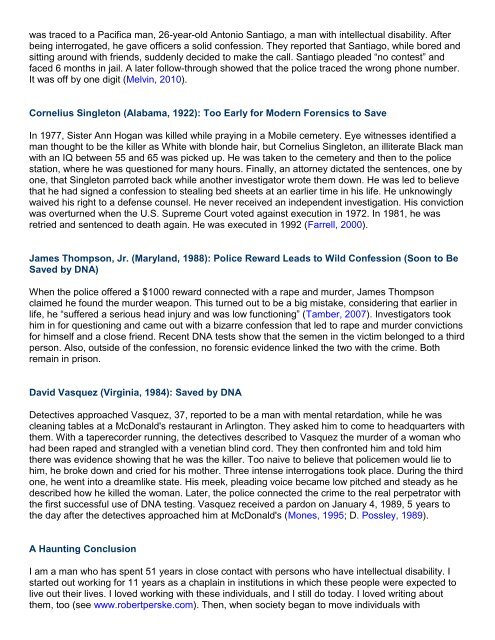Perske's List: False Confessions From 75 Persons ... - Robert Perske
Perske's List: False Confessions From 75 Persons ... - Robert Perske
Perske's List: False Confessions From 75 Persons ... - Robert Perske
You also want an ePaper? Increase the reach of your titles
YUMPU automatically turns print PDFs into web optimized ePapers that Google loves.
was traced to a Pacifica man, 26-year-old Antonio Santiago, a man with intellectual disability. After<br />
being interrogated, he gave officers a solid confession. They reported that Santiago, while bored and<br />
sitting around with friends, suddenly decided to make the call. Santiago pleaded ―no contest‖ and<br />
faced 6 months in jail. A later follow-through showed that the police traced the wrong phone number.<br />
It was off by one digit (Melvin, 2010).<br />
Cornelius Singleton (Alabama, 1922): Too Early for Modern Forensics to Save<br />
In 1977, Sister Ann Hogan was killed while praying in a Mobile cemetery. Eye witnesses identified a<br />
man thought to be the killer as White with blonde hair, but Cornelius Singleton, an illiterate Black man<br />
with an IQ between 55 and 65 was picked up. He was taken to the cemetery and then to the police<br />
station, where he was questioned for many hours. Finally, an attorney dictated the sentences, one by<br />
one, that Singleton parroted back while another investigator wrote them down. He was led to believe<br />
that he had signed a confession to stealing bed sheets at an earlier time in his life. He unknowingly<br />
waived his right to a defense counsel. He never received an independent investigation. His conviction<br />
was overturned when the U.S. Supreme Court voted against execution in 1972. In 1981, he was<br />
retried and sentenced to death again. He was executed in 1992 (Farrell, 2000).<br />
James Thompson, Jr. (Maryland, 1988): Police Reward Leads to Wild Confession (Soon to Be<br />
Saved by DNA)<br />
When the police offered a $1000 reward connected with a rape and murder, James Thompson<br />
claimed he found the murder weapon. This turned out to be a big mistake, considering that earlier in<br />
life, he ―suffered a serious head injury and was low functioning‖ (Tamber, 2007). Investigators took<br />
him in for questioning and came out with a bizarre confession that led to rape and murder convictions<br />
for himself and a close friend. Recent DNA tests show that the semen in the victim belonged to a third<br />
person. Also, outside of the confession, no forensic evidence linked the two with the crime. Both<br />
remain in prison.<br />
David Vasquez (Virginia, 1984): Saved by DNA<br />
Detectives approached Vasquez, 37, reported to be a man with mental retardation, while he was<br />
cleaning tables at a McDonald's restaurant in Arlington. They asked him to come to headquarters with<br />
them. With a taperecorder running, the detectives described to Vasquez the murder of a woman who<br />
had been raped and strangled with a venetian blind cord. They then confronted him and told him<br />
there was evidence showing that he was the killer. Too naive to believe that policemen would lie to<br />
him, he broke down and cried for his mother. Three intense interrogations took place. During the third<br />
one, he went into a dreamlike state. His meek, pleading voice became low pitched and steady as he<br />
described how he killed the woman. Later, the police connected the crime to the real perpetrator with<br />
the first successful use of DNA testing. Vasquez received a pardon on January 4, 1989, 5 years to<br />
the day after the detectives approached him at McDonald's (Mones, 1995; D. Possley, 1989).<br />
A Haunting Conclusion<br />
I am a man who has spent 51 years in close contact with persons who have intellectual disability. I<br />
started out working for 11 years as a chaplain in institutions in which these people were expected to<br />
live out their lives. I loved working with these individuals, and I still do today. I loved writing about<br />
them, too (see www.robertperske.com). Then, when society began to move individuals with


